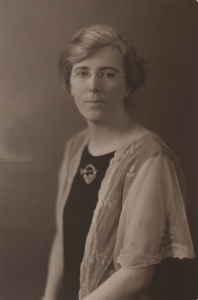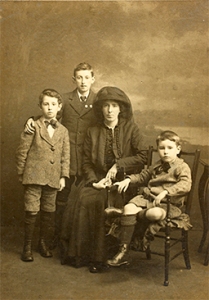
Kathleen Daly was born in County Limerick in 1878 to a family of strong nationalists; her father and uncle were prominent Fenians (republicans). Kathleen was raised in a home where sacrifice for an independent Ireland was encouraged, and sacrifice to the death was seen as an honorable one. After a seamstress apprenticeship, she started her own successful dressmaking business before she was eighteen.
Through her uncle, John Daly, she met republican activist Thomas Clarke. Twenty years older than she, and somewhat diminished physically by his time spent in prison for revolutionary actions, he was yet an heroic figure to Kathleen, and, in 1901, she left Ireland to marry him. They ran a shop in New York City, but, by 1907, Tom was anxious to resume his Fenian efforts and they returned to Ireland. They settled in Dublin and ran shops there, as well.
As a prominent advanced nationalist and a feminist, Clarke co-founded the militant women’s organization Cumman na mBan in 1914, and became president of its central branch. She also assisted with the production of the Irish Republican Brotherhood newspaper Irish Freedom, sold at her husband’s store in Dublin. Thomas Clarke was a key leader in the Easter Rising and a signatory of the Proclamation who was executed immediately after the Rising. Shortly after her husband’s execution, Kathleen heard that her young brother suffered the same fate.

Though Clarke lost both her husband and her brother to the Rising, she remained a committed Irish nationalist, feminist, humanitarian, and successful politician.
A bag of gold entrusted to her by Tom was the base from which Kathleen established the Volunteer Dependents’ Fund to distribute assistance to families of Irish Volunteer troops who participated in the Rising. Four years later, she continued her humanitarian work when she co-founded the Irish White Cross to distribute funds raised by the American Committee for Relief in Ireland.
Clarke also became an active politician after the Rising. At the 1917 Sinn Féin convention, Clarke was an outspoken advocate for women’s rights, and successfully lobbied for the party’s policy platform to include equal rights for men and women. Clarke rejected the Anglo-Irish Treaty of 1921, but continued her political career after the Civil War. She was elected to the Second Dáil as a founding member of the Fianna Fáil party and in the Seanad (senate) from 1928 to 1936. Then, in 1939, she was the first woman to be elected Lord Mayor of Dublin.
Clarke remained involved in humanitarian and political causes for the rest of her life. She died in 1972 and was given a state funeral in Dublin. Kathleen Clarke was a living embodiment of the political power that Irish feminist women demanded and then wielded in the early twentieth century.
See other posts in the Irish Women Rising series, commemorating prominent women of the revolutionary period, 1900 to 1923.
- Kathleen Williams, Senior Reference Librarian, Bibliographer for Irish Studies, John J. Burns Library
Works Consulted
Clarke, Kathleen (ed. Litton, Helen). Revolutionary Woman. Dublin: O’Brien Press, 1991
Frances Clarke. “Clarke, Kathleen (Caitlín Bean Uí Chléirigh) Daly”. Dictionary of Irish Biography. (ed.) James McGuire, James Quinn. Cambridge, United Kingdom: Cambridge University Press, 2009.
(http://dib.cambridge.org.proxy.bc.edu/quicksearch.do;jsessionid=C10562ADA74291677276E477861B5DA4#)
Leave a comment